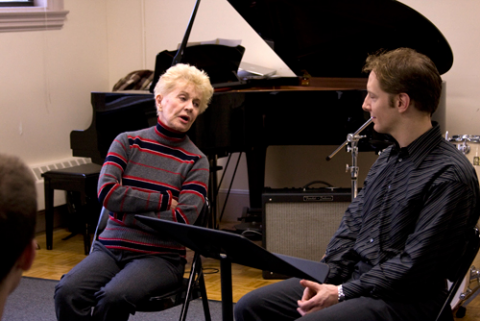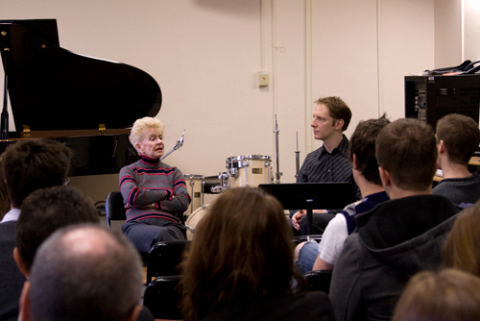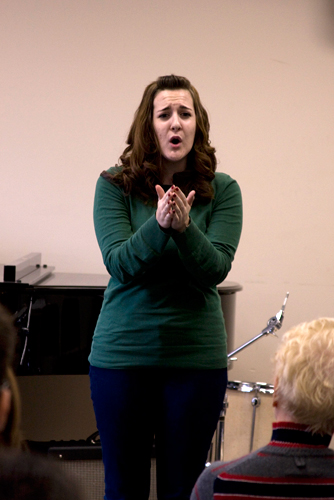Jo Loesser and Broadway

"Frank was a guy who made big jumps: he’d give you a C and then a G, and you'd go, 'Jesus!'"
Photo by Jennifer Shanley

"Frank wrote 'Baby It’s Cold Outside' to sing at parties. In the old days they used to always sing at parties in New York. Steven Sondheim played his score for <i>A Funny thing Happened on the Way to the Forum</i> for the first time at our house. He sat down at the piano and played the whole score."
Photo by Jennifer Shanley

"Frank wrote a song called 'Wanting to be Wanted,' which he made into the verse for 'Somebody Somewhere,' because most people never wasted music. As a matter of fact, 'My Poor, Poor Feet' was really for the cop from <i>Guys and Dolls.</i>"
Photo by Jennifer Shanley

Hannah Rash sings "Fable."
Photo by Jennifer Shanley

Ilana Friedman sings "Lying There."
Photo by Jennifer Shanley

Elliot Aguilar sings "What Do I Need with Love."
Photo by Jennifer Shanley
Students in Michael Wartofsky's Musical Theater Writing class got a treat last semester: a visit from Broadway singer Jo Loesser. Loesser has performed in some of the most iconic Broadway musicals, including The Threepenny Opera and The Most Happy Fella. She was on campus for a concert celebrating the 100th anniversary of the birth of her husband, Frank Loesser, who wrote music or lyrics for Guys and Dolls, How to Succeed in Business without Really Trying, and The Most Happy Fella, as well as a slew of Hollywood movies, including Some Like It Hot. After a Q&A with Wartofsky and Loesser, four students had the opportunity to stage mock auditions and receive feedback from her. The following is a condensed and edited version of the Q&A.
Michael Wartofsky: You were already a successful performer before you met your husband, and I wondered if you could start out by telling us about your working relationship with director Marc Blitzstein and your experience with his production of The Threepenny Opera.
Jo Loesser: I came to New York to go to Juilliard, as one always did in those days, and I had to get a scholarship. I didn't pass. I had studied music for three years in St. Louis, vocals and piano. I was lucky enough to have met a woman there whose husband was the assistant conductor for the St. Louis Symphony, and so she said, "Don't go back home." She found a wonderful singing teacher for me, and it so happened that his wife was the head of Lord & Taylor, and she got me a job as a file clerk. So I worked at Lord & Taylor, I took singing lessons, and I went to Columbia University at night and studied theory and counterpoint, until I met up with some people and they said, "You need to get in the chorus of a Broadway show. That's where you're going to learn." So I did. I was in the chorus, the last year it was on Broadway, of Oklahoma. It was terrific. And then I was in the chorus of two more shows. They lasted a while and then I decided, okay, I've done the chorus bit now.
So I auditioned for a show called Let's Make an Opera. Benjamin Britten wrote it. In the first act we wrote the opera and in the second act we sang it. And the director was Marc Blitzstein. Anyway, the critics said, "Let's not." So that settled our hash. We did not run but five days on Broadway, but I became friendly with Marc Blitzstein. I admired his work very much; I think Regina is an absolutely wonderful piece. Marc had done the translation for The Threepenny Opera; he wanted to do it at this off-Broadway theater, the Lucille Lortel Theatre, it's called now. I was chosen to play Polly Peachum. We had it directed by Carmen Capalbo, Lotte Lenya was Jenny, Bea Arthur played Lucy, and we had the original orchestrations from Germany. The reviews were horrible, and we closed a month later. Brooks Atkinson was the critic at the New York Times at that time, and at the end of every review he would write, "Bring back The Threepennny Opera." And we did the next year. Same cast, in the same theater, with the same costumes, with the same orchestrations, and we got great reviews. Now can you tell me how that happened? I can't figure it out; it was the damnedest thing I've ever heard. It ran for five years.
MW: You said you auditioned 20 times for The Most Happy Fella, so it sounds like you were put through the ringer. I understand you first met Frank at these auditions. What were your first impressions of him and what was your experience working with him on that show?
JL: He was very very crazy. What he mostly did to people when they auditioned was make them sing "Happy Birthday." He did that because he could find out how high you could go. And he was always running around and telling you exactly what he wanted, and sometimes you wanted to kill him because it was too much. Because you want to act—I think that's what a song is about, once you learn it. He was very particular with what he wanted you to do. As a matter of fact, I don't know if any of you know the musical called Green Willow; it has "Never Will I Marry." Tony Perkins was the lead in that, and he really couldn't sing, but he was so right for the part. And he was struggling. Frank took him in a room and was going to teach him how to sing the song. I thought, "Oh, my god, that poor guy." And he came out two hours later white, but he sang the song much better.
MW: You mentioned Sondheim came over to play the score for A Funny Thing Happened on the Way to the Forum. I was struck by a parallel of Frank starting out as a lyricist and figuring out that he was also a fantastic composer. Could you talk some about his transition to writing music and lyrics, and eventually music, lyrics, and libretto?
JL: Well, his father was a piano teacher, and his older brother, Arthur Loesser, was a great pianist, head of the music department at Cleveland Institute of Music. So naturally Frank was not going to take piano lessons. He tried a whole lot of different things when he got out of college and he met William Schumacher, who became head of Juilliard. They wrote a song together called "In Love with the Memory of You." It never went too far, from the sound of it. He decided to go to Hollywood—that's what they did in those days—and he went with a friend and they were lucky enough to be hired. In those days they hired composers and lyricists and musicians to write the film. So for $250 a week they would write the songs. All the great Broadway composers were out there. He learned a lot from them.
MW: I understand for Where's Charley? he was hired to be the lyricist and there was a snafu...
JL: Well, Harold Arlen, who wrote "Stormy Weather," was supposed to write the music and Frank was going to write the lyrics. But Harold's house burned down, and he got so upset he couldn't do it. So Frank went to the producers and said, "Come on, you guys; let me write the music and lyrics." And they said yes. And of course out of that he got big hit.
MW: What advice would you have for the composers and lyricists in the room who are interested in playing this music?
JL: You have to get a project with someone that you have a rapport with. And you have to write a script and do the show with people here first and get the critiques from what they say and then work on it again. And then do it again. And then you go and try to do it someplace like O'Neill or another school. You just have to keep auditioning and see where you can get it on.
Parent: What were Frank's work habits?
JL: He got up at four in the morning and worked until about eight in the morning. He had a silent piano, because I made him get one. If he couldn't write, he read the dictionary and the encyclopedia. And then at eight I would get up and I would have a cup of coffee and he would have a martini. He'd been up for four hours—it was lunch! And then he would go and take a nap and then he would go to the office. He founded the company called Music Theatre International that booked all the shows all over. He also owned Boston Music Company.
